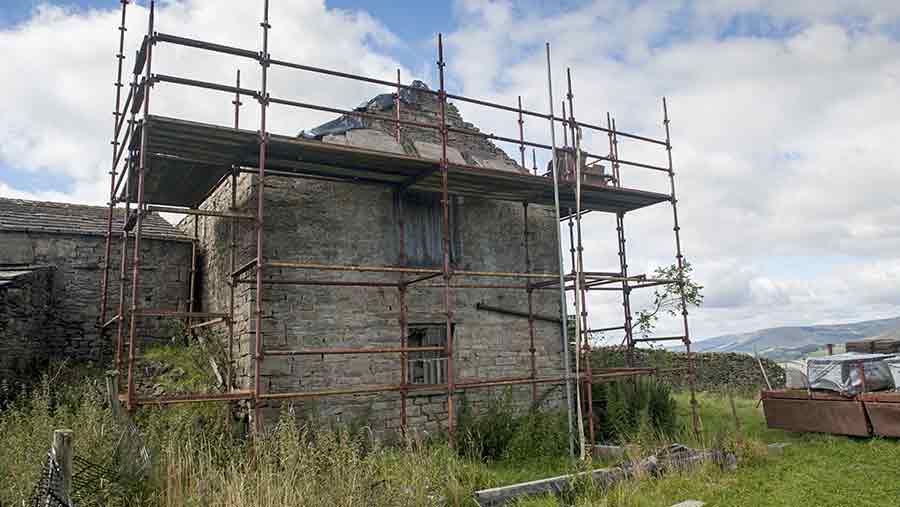Business Clinic: Barn conversion to nursery – advice on income tax and VAT position
 © Hutchinsons/ Rex Shutterstock
© Hutchinsons/ Rex Shutterstock Farmers Weekly’s Business Clinic experts offer free advice on legal, finance, tax, insurance, farm management and land issues.
Here, Lisa Oliver, manager Farm and Estates Team at Hazlewoods gives some advice on diversification.
Q: We run a 150-acre sheep and arable business as a family partnership.
We recently got prior notification permission for change of use on some farm buildings to a farm-based children’s day nursery. We plan to let the building to our daughter to run the nursery business.
Are the repairs and conversion an allowable cost for income tax purposes and will the input VAT be recoverable through the farm accounts?
A: Repairing the existing structure while it is used in the farming business would allow the cost to be claimed as an income tax deduction in the farm accounts and all input VAT would be recoverable.
The conversion costs will be capital expenditure and unfortunately will not qualify for income tax relief, although capital allowances may be available on any integral features, for example, electrical systems.
See also: Should clay shoot be part of farming business
Provided the Annual Investment Allowance (AIA) has not been fully utilised then the “integral features” would receive 100% tax relief in the year of expenditure; if the AIA has been fully utilised these costs would be eligible for capital allowances at 8%/year on a reducing balance basis.
The rental income from letting the converted building will be exempt from VAT and thus the farming partnership will become a partially exempt business. The exempt input VAT (in this case VAT on conversion costs) will be recoverable provided it falls within the partial exemption rules known as ‘de minimis’ limits.
These stipulate that input VAT attributable to the exempt rental income is recoverable provided it is below £7,500/year and less than 50% of the total input VAT incurred in one VAT year. If these limits are breached, none of the exempt input VAT is recoverable.
Assuming the partnership has no other exempt income, then the full de minimis limits would be available for the conversion of these buildings.
However, if the business has not previously incurred any input tax relating to exempt supplies, the full £7,500 limit will have to be apportioned depending on how far into the VAT year the work commences.
If it is likely that the net expenditure will exceed £37,500 (on which the VAT @ 20% would be £7,500), then staggering the work over two VAT years would mean that potentially up to £75,000 net spend could be undertaken with all input VAT being recoverable.
If the input VAT on the project costs are likely to exceed the de minimis limits, there may be the opportunity to “opt to tax” the building, making all input VAT relating to the building conversion recoverable, although output VAT would then have to be charged on the rent.
Your daughter would be considered a “connected party” for tax purposes, which would mean the rent would have to be at market value.
The supply of childcare services is VAT exempt. If this is the only service provided by your daughter’s business then she will be unable to register for VAT and if the decision is taken to opt to tax the building the VAT charged on the rental will not be recoverable and will be an additional cost to the nursery.
As your daughter is a connected person to the family partnership, the option to tax route will not be applicable if net expenditure on the conversion exceeds £250,000.
Valuable tax reliefs such as Business Property Relief for inheritance tax and Entrepreneurs’ Relief for capital gains tax require a business to be trading.
You should ensure that the level of rental income and profits from the new venture does not affect the availability of these and other tax reliefs for the farming business.
In summary, any repairs to the existing building will qualify for tax relief and the input VAT will be recoverable.
Unfortunately none of the conversion costs will be allowable for income tax, and the input VAT will be recoverable provided it falls within the de minimis limits.
By opting to tax the building an immediate up front VAT saving is achieved, with the VAT cost being “drip fed” in the rentals over a number of years.
Do you have a question for the panel?
Outline your legal, tax, finance, insurance or farm management question in no more than 350 words and Farmers Weekly will put it to a member of the panel. Please give as much information as possible.
Send your enquiry to Business Clinic, Farmers Weekly, RBI, Quadrant House, The Quadrant, Sutton, Surrey SM2 5AS.
You can also email your question to fwbusinessclinic@rbi.co.uk or post it on the Farmers Weekly website.


